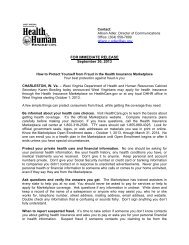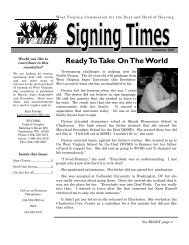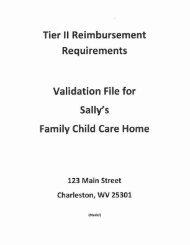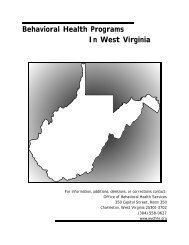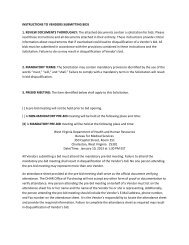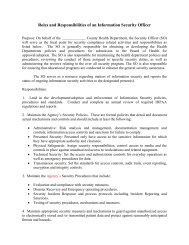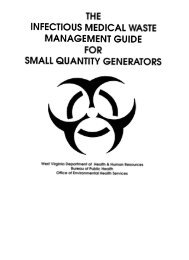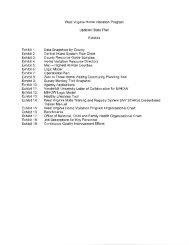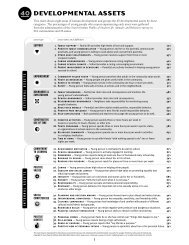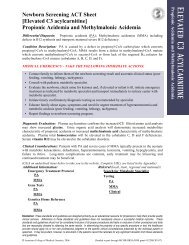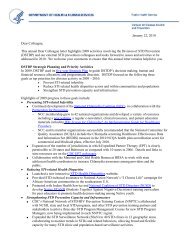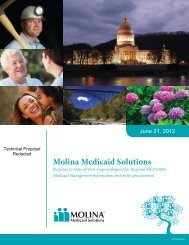Obligations of Hospitals and Nursing Homes to Provide ... - DHHR
Obligations of Hospitals and Nursing Homes to Provide ... - DHHR
Obligations of Hospitals and Nursing Homes to Provide ... - DHHR
You also want an ePaper? Increase the reach of your titles
YUMPU automatically turns print PDFs into web optimized ePapers that Google loves.
<strong>Obligations</strong> <strong>of</strong> <strong>Hospitals</strong> <strong>and</strong> <strong>Nursing</strong> <strong>Homes</strong> <strong>to</strong> <strong>Provide</strong>Interpreters <strong>and</strong> Auxiliary Aids for Deaf <strong>and</strong> Hard <strong>of</strong> HearingPatientsReprinted with permission from the National Association <strong>of</strong> the Deaf Law <strong>and</strong> Advocacy CenterInpatient health care facilities have important responsibilities under federal law <strong>to</strong>be accessible <strong>to</strong> deaf <strong>and</strong> hard <strong>of</strong> hearing individuals. Failing <strong>to</strong> provideinterpreters <strong>and</strong> adapted equipment may be discrimination on the basis <strong>of</strong>disability. In addition, failure <strong>to</strong> establish effective communication with a deafpatient may expose a health care provider <strong>to</strong> liability for medical malpractice.This memor<strong>and</strong>um addresses the obligations <strong>of</strong> a hospital <strong>to</strong> provide qualifiedinterpreters <strong>to</strong> its deaf <strong>and</strong> hard <strong>of</strong> hearing patients. This right is establishedunder two federal laws.Section 504 <strong>of</strong> the Rehabilitation Act <strong>of</strong> 1973Section 504 <strong>of</strong> the Rehabilitation Act <strong>of</strong> 1973, 29 U.S.C. Š 794, requires federalfinancial recipients' programs <strong>to</strong> be equally accessible <strong>to</strong> h<strong>and</strong>icapped persons.The U.S. Department <strong>of</strong> Health <strong>and</strong> Human Services (HHS) regulations <strong>to</strong>Section 504 require pro vision <strong>of</strong> necessary auxiliary aids, such as sign languageinterpreters, <strong>to</strong> ensure equal access <strong>to</strong> federal financial recipients' programs.These regulations specify that:A recipient <strong>to</strong> which this subpart applies that employs fifteen or more personsshall provide appropriate auxiliary aids <strong>to</strong> persons with impaired sensory,manual, or speaking skills, where necessary <strong>to</strong> afford such persons an equalopportunity <strong>to</strong> benefit from the service in question.* * *For the purpose <strong>of</strong> this paragraph, auxiliary aids may include brailled <strong>and</strong> tapedmaterial, interpreters, <strong>and</strong> other aids for persons with impaired hearing or vision.45 C.F.R. Š 84.52(d)Provision <strong>of</strong> qualified sign language interpreters is critical <strong>to</strong> ensure that deafpersons are able <strong>to</strong> benefit from <strong>and</strong> participate equally in the program. TheOffice for Civil Rights <strong>of</strong> HHS has consistently required hospitals <strong>to</strong> providequalified interpreters <strong>and</strong> TDDs <strong>to</strong> deaf clients, <strong>and</strong> has stated:. . . it would be extremely difficult for the health care provider <strong>to</strong> demonstrate incertain service settings, that effective communication is being provided in theabsence <strong>of</strong> . . . interpreters.24
Section 504, Effective Communications, <strong>and</strong> Health Care <strong>Provide</strong>rs, U.S.Department <strong>of</strong> Health <strong>and</strong> Human Services, Region III, Regional TechnicalAssistance Staff (January, 1982), page 5.The Department <strong>of</strong> Health <strong>and</strong> Human Services, Office for Civil Rights (OCR)has determined that effective communication must be provided at "critical points"during hospitalization. OCR has defined "critical points" as follows:These would include those points during which critical medical information iscommunicated, such as at admission, when explaining medical procedures,when an informed consent is required for treatment <strong>and</strong> at discharge.U.S. Department <strong>of</strong> Health <strong>and</strong> Human Services, Office for Civil Rights, RegionIII, Letter <strong>of</strong> Findings, Ref. No. 03913037 (December 12, 1991), at page 5.Moreover, HHS has repeatedly stated that the deaf patient's assessment <strong>of</strong> his orher communication needs must be given great deference:In most circumstances, we believe that the hearing impaired person is in the bestposition <strong>to</strong> determine what means <strong>of</strong> communication is necessary <strong>to</strong> insure anequal opportunity <strong>to</strong> benefit from health care services. Therefore, the patient'sjudgment regarding what means <strong>of</strong> communication is necessary <strong>to</strong> insureeffective communication must be accorded great weight.* * *The presumption favoring the hearing impaired patient's self assessed need isnot overcome merely by a showing that the hearing impaired patient suffered noharm. Rather, the recipient must demonstrate that the hearing impaired patientactually unders<strong>to</strong>od what was being communicated through the alternativecommunication option.Stewart, Roma, (Direc<strong>to</strong>r, HEW Office for Civil Rights), "Memor<strong>and</strong>um: OCR'sPosition on the Provision <strong>of</strong> Auxiliary Aids for Hearing Impaired Patients inInpatient, Outpatient <strong>and</strong> Emergency Treatment Settings," (April 21, 1980), page2.Many physicians wonder why the exchange <strong>of</strong> written notes will not suffice with adeaf patient. The Department <strong>of</strong> Health <strong>and</strong> Human Services recognizes thatthere is a distinction between English <strong>and</strong> American Sign Language, <strong>and</strong> thatwritten communications, or interpreters not skilled in American Sign Language(ASL), will not suffice as effective communication for deaf persons who utilizeASL:25
. . . American Sign Language (ASL) [is] a manually communicated languagedistinct from English <strong>and</strong> whose idioms <strong>and</strong> concepts are not directly translatablein<strong>to</strong> English. It uses different sentence structure, grammar <strong>and</strong> syntax thanEnglish, <strong>and</strong> is as much a foreign language <strong>to</strong> English speaking persons as isFrench or German. Conversely, English is equally foreign <strong>to</strong> most deaf personswho rely on ASL for communication. It is a common misconception that "signlanguage" is merely a pan<strong>to</strong>mime <strong>of</strong> the English language <strong>and</strong> is therefore easilyunderst<strong>and</strong>able in print if not audi<strong>to</strong>rily. ASL sentences do not follow Englishsequential patterns. As a result, direct translation <strong>of</strong> English, as with writtennotes, in<strong>to</strong> ASL will not necessarily convey the intended message. Similarly,much <strong>of</strong> English idiomatic speech would be lost on the ASL user whose frame <strong>of</strong>reference for idiom is significantly different from the hearing person.U.S. Department <strong>of</strong> Health <strong>and</strong> Human Services, Office for Civil Rights, RegionIII, Letter <strong>of</strong> Findings, Ref. No. 03913037 (December 12, 1991) page 4.Please note that there is no distinction between in-patient <strong>and</strong> out-patienttreatment. All services provided by health care facilities must be accessible.Americans with Disabilities Act (ADA)In addition <strong>to</strong> hospitals' Section 504 obligations, hospitals, physicians <strong>and</strong> nursinghomes have a federal obligation <strong>to</strong> provide auxiliary aids <strong>and</strong> services <strong>to</strong> disabledpatients under Title II (public hospitals) or Title III (private facilities) <strong>of</strong> theAmericans with Disabilities Act, 42 U.S.C. 12181 et seq. The ADA covers places<strong>of</strong> public accommodation <strong>and</strong> public entities, regardless <strong>of</strong> whether that entityreceives federal financial assistance. The U.S. Department <strong>of</strong> Justice regulation<strong>to</strong> Title III <strong>of</strong> the ADA, 28 C.F.R. Part 36, <strong>and</strong> the Analysis there<strong>to</strong>, 56 Fed. Reg.35544 (July 26, 1991), provide information on the exact nature <strong>of</strong> what will berequired under the ADA. Public accommodations are required <strong>to</strong> provide auxiliaryaids when necessary <strong>to</strong> enable a person with disabilities <strong>to</strong> benefit from theirservices:A public accommodation shall furnish appropriate auxiliary aids <strong>and</strong> serviceswhere necessary <strong>to</strong> ensure effective communication with individuals withdisabilities.28 C.F.R. Š36.303(c). The definition <strong>of</strong> auxiliary aids <strong>and</strong> services includes, fordeaf <strong>and</strong> hard <strong>of</strong> hearing individuals, "qualified interpreters." 28 C.F.R.36.303(b)(1). The definition <strong>of</strong> what constitutes a qualified interpreter is also setforth in this regulation. The U.S. Department <strong>of</strong> Justice has defined "qualifiedinterpreter" <strong>to</strong> mean:. . . an interpreter who is able <strong>to</strong> interpret effectively, accurately <strong>and</strong> impartiallyboth receptively <strong>and</strong> expressively, using any necessary specialized vocabulary.26
28 C.F.R. 36.104; 28 C.F.R. 35.104.While the Departments <strong>of</strong> Health <strong>and</strong> Human Services, <strong>and</strong> Justice, have notrequired certification for interpreters under these federal laws, due <strong>to</strong> the difficultyin some areas <strong>of</strong> the nation <strong>to</strong> secure a certified interpreter, it is doubtful that anyindividual who has not been formally trained as an interpreter can perform thefunctions <strong>of</strong> a medical interpreter. <strong>Hospitals</strong> are strongly advised <strong>to</strong> useadequately trained interpreters, in order <strong>to</strong> avoid the possibility <strong>of</strong> misdiagnosis orimproper treatment as a result <strong>of</strong> inadequate communication.The Department <strong>of</strong> Justice specifically cautions against the use <strong>of</strong> familymembers or friends as interpreters:In certain circumstances, notwithst<strong>and</strong>ing that the family member or friend is able<strong>to</strong> interpret or is a certified interpreter, the family member or friend may not bequalified <strong>to</strong> render the necessary interpretation because <strong>of</strong> fac<strong>to</strong>rs such asemotional or personal involvement or considerations <strong>of</strong> confidentiality that mayadversely affect the ability <strong>to</strong> interpret "effectively, accurately, <strong>and</strong> impartially."56 Fed. Reg. at 35553.The problems that may arise with having a family member or friend interpreting ina medical setting are considerable. There may be necessary information that thefamily member fails <strong>to</strong> communicate, in a misguided effort <strong>to</strong> shield the deafpatient. There may be questions the deaf person will not ask in the presence <strong>of</strong>the family member or friend. The family member or friend may be <strong>to</strong>o emotionallyupset by the medical situation <strong>to</strong> interpret correctly. Finally, the family member orfriend will seldom meet the qualification requirements <strong>of</strong> the law.The Department <strong>of</strong> Justice does not permit a public accommodation <strong>to</strong> charge aperson with a disability for the cost <strong>of</strong> the auxiliary aid provided. The Title IIIregulation states:A public accommodation may not impose a surcharge on a particular individualwith a disability . . . <strong>to</strong> cover the costs <strong>of</strong> measures, such as the provision <strong>of</strong>auxiliary aids . . that are required <strong>to</strong> provide that individual . . . with thenondiscrimina<strong>to</strong>ry treatment required by the Act or this part.28 C.F.R. 36.301(c).Inpatient facilities also have responsibilities under the ADA <strong>to</strong> assure that theirtelephone services, television services, <strong>and</strong> other services are accessible <strong>and</strong>usable by deaf individuals. For information about the responsibility <strong>to</strong> provideTTYs, captioned televisions, flashing light warning systems <strong>and</strong> alarms, contactthe NAD Law Center.27
There are tax credits available for expenses incurred in the course <strong>of</strong>accommodating patients with disabilities. The Access Credit, created by theRevenue Reconciliation Act <strong>of</strong> 1990, provides a tax credit <strong>of</strong> one half <strong>of</strong> the cost<strong>of</strong> interpreters <strong>and</strong> similar measures that exceed $250.00. This credit, availableonly <strong>to</strong> businesses which have either thirty or fewer full time employees or grossreceipts <strong>of</strong> under one million dollars annually, will greatly reduce the cost <strong>of</strong> suchaccommodations for most physicians.For more information, visit www.nad.org/hospitalsnursinghomes.The National Association <strong>of</strong> the Deaf (NAD) Law <strong>and</strong> Advocacy Centerprepared this material as informal guidance. This is not legal advice. TheNAD assumes no liability for this material.For additional information or technical assistance about how laws againstdisability discrimination apply <strong>to</strong> you, contact the NAD Law <strong>and</strong> AdvocacyCenter, 301-587-7730 (Voice/TTY), 301-587-0234 (FAX), nadlaw@nad.org; alocal at<strong>to</strong>rney (for more information, see Get a Lawyer); or an enforcementagency, see list at www.ada.gov or call 800-514-0301 (Voice) or800-514-0383 (TTY).28



